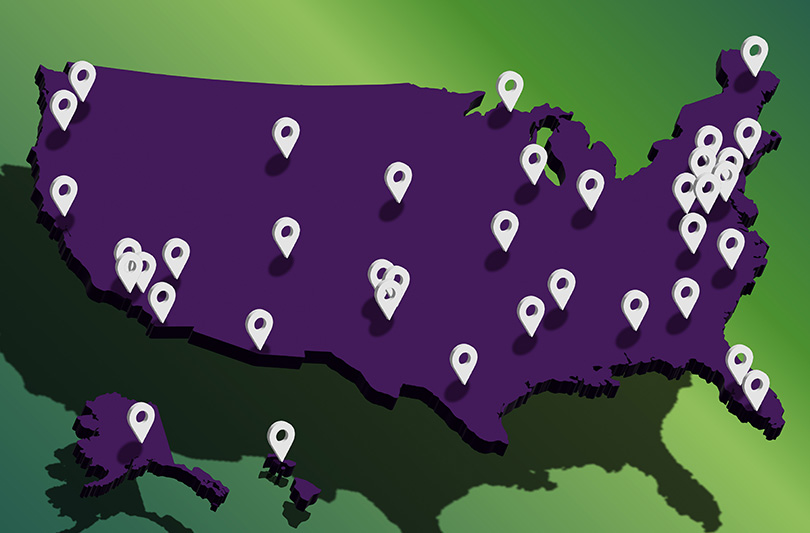Do You Know Your Sales Tax Nexus?

What is Sales Tax Nexus?
If you are in the business of selling, your sales tax obligation is referred to as “Nexus”. Sales tax nexus determines whether a business is required to collect sales tax on sales made to customers within a particular state. Each state in the U.S. has its own regulations regarding sales tax nexus.
Almost every state requires businesses to register to collect and file sales tax if their sales volume is high enough.
Once a business has sales tax nexus in a state, it is generally required to register for a sales tax permit with the state, collect the appropriate amount of sales tax from customers, and remit those taxes to the state on a regular basis. Some states like California have regional sales tax rates as well. Failure to comply with sales tax nexus requirements can result in penalties, fines, and other legal liabilities for businesses. Therefore, it’s crucial for businesses to understand the sales tax nexus rules.
What Affects Sales Nexus?
E-commerce businesses need to be aware of several key aspects of sales tax nexus to ensure compliance. Here are some important points to consider:
- Economic Nexus: Many states have enacted economic nexus laws. This bases sales tax obligations on a business’s economic activity within the state, even without a physical presence. The economic nexus is triggered when a business exceeds a certain threshold of sales or transactions in a state within a specified period.
- Physical Nexus: Physical presence nexus is still relevant for e-commerce businesses. Physical nexus is established when a business has a physical presence in a state.
- Click-through Nexus: Some states have click-through nexus laws. This applies to e-commerce businesses that make sales through referral relationships with in-state affiliates. Click-through nexus is established when a business pays commissions or other considerations to in-state affiliates for referring customers who make purchases through the business’s website.
- Marketplace Facilitator Laws: Many states have enacted laws that require marketplace facilitators, such as online marketplaces like Amazon or eBay, to collect and remit sales tax on behalf of third-party sellers on their platforms. E-commerce businesses that sell through marketplace facilitators need to understand the marketplace facilitator laws in each state and determine if they are relieved of the obligation to collect sales tax.
- Voluntary Disclosure Programs: Some states offer voluntary disclosure programs that allow e-commerce businesses to come into compliance with sales tax laws by voluntarily disclosing past sales tax liabilities and registering for a sales tax permit, often with reduced or waived penalties. E-commerce businesses that have potential sales tax nexus exposure in a state should consider voluntary disclosure programs as a way to mitigate potential penalties and interest.
- Record Keeping and Reporting: E-commerce businesses need to maintain accurate records of their sales activities, including sales by state, and properly report sales tax collected and remitted on their sales tax returns. Robust record-keeping and reporting processes are essential for sales tax compliance and may be subject to audit by state tax authorities.
It’s important to be aware of sales tax nexus rules in each state where they have customers or conduct business, and take appropriate steps to comply with sales tax laws, including:
- registering for sales tax permits
- collecting and remitting sales tax
- maintaining accurate records
- seeking professional tax advice as needed
How do I Automate Sales Tax Nexus for my business?
Navigating sales tax laws and regulations can be confusing, and the consequences of mistakes can be expensive. Automating your sales taxes as a business offers several advantages, including increased accuracy, time and cost savings, scalability, compliance with changing sales tax laws, enhanced reporting, and improved customer experience. It’s important to carefully select an automated sales tax solution that meets the specific needs of your business to ensure compliance with sales tax laws.
“As eCommerce developers, we like to find automation solutions that make our customer’s businesses run smoothly. Avalara provides a level of service for automating sales tax nexus, collection and filings, that takes the burden off the business owner so they can focus on what they love – running their business.”
-De Ivett, 5D Spectrum CEO
5D Spectrum is partnered with Avalara to keep clients up to date on sales tax nexuses and laws. Using their extensive database of all the most recent laws and regulations, Avalara makes sales tax efficient and easy.
For a completely FREE sales tax risk assessment, valued at $4,500, AND a free consultation with a tax professional, use this link: https://buy.avalara.com/risk-assessment?partnersource=0014000000gEJIBAA4&campaignid=7015a000001j1zEAAQ&c=3JC9J4V7ZT
For more information, contact 5D Spectrum.